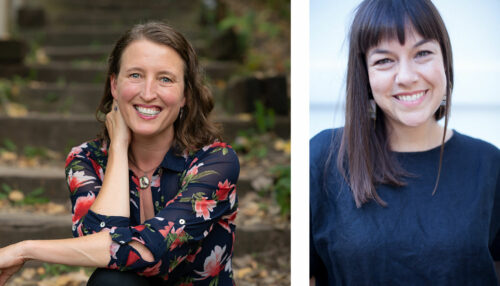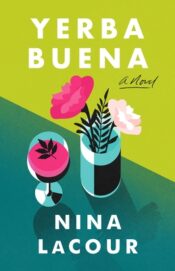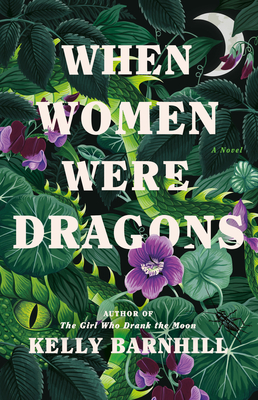by Trisha Collopy
In six novels for young adults, including Everything Leads to You and the Printz Award-winning We Are Okay, Nina LaCour has carved out a fictional terrain in the liminal space between late adolescence and early adulthood, exploring themes of grief, loss and the ways people move forward, despite those setbacks. Yerba Buena (Flatiron Books, $26.99), her first novel for adults, follows Sara Foster, who flees a devastating discovery in her hometown to Los Angeles; there, she finds a precarious emotional balance that is challenged when she begins a relationship with a young florist, Emilie.
Minneapolis writer Kelly Barnhill has written five novels for middle-grade readers, including The Girl Who Drank the Moon, which won the Newbery Award, and The Ogress and the Orphans, published earlier this year. Her imaginary worlds are rich with inventive detours (including, in Ogress, an endless library and opinionated crows), even as they explore deeply skewed power structures and the ways young people push back against an unjust world. Barnhill also published her first novel for adults this spring: When Women Were Dragons (Doubleday, $28) imagines a country frozen in the rigid gender roles of the 1950s, where women have so much suppressed rage that they turn into dragons.
Both LaCour and Barnhill teach in the low-residency MFA program in writing for children and young adults at Hamline University in St. Paul. The following conversation focuses on the boundaries between young-adult and adult fiction, and what that distinction means for writers shaping a story and for the readers who find it.
Trisha Collopy: Nina, the opening of Yerba Buena feels like it had a darkness behind it, and that's really haunted me. What was the seed of that story for you? And when did you know that this book might be edging out of the audience you had previously been writing for?
Nina LaCour: I always knew that this was an adult novel, because I knew that I was going to be following the characters in their twenties and maybe thirties, so going into it with that knowledge allowed me to explore the things that happened to Sara. It gave me permission to stay focused on the story and what I felt the story needed, and not to care as much about protecting my readers. I always write truthfully, and I always want to tell an honest story, but when I write for young people, I am conscious of who I'm asking to read this book—and I do it in a way that I feel holds them close as I explore really hard things. In writing for adults, I felt less of a responsibility to hold my readers close; rather, I felt like I am an adult telling another adult a story. We all have had to face hard things in our lives. So yeah, it was with less of a sense of responsibility to the reader and more of a sense of responsibility to this story.
TC: Kelly, when did you know you were writing a novel for adults?
Kelly Barnhill: I had kind of sworn off writing—again—but I was asked to contribute a short story to an anthology of dragon stories, and you don’t say no to Jonathan Strahan, because he’s so nice. I was in the car with my daughter, and we were listening to the Brett Kavanaugh hearings. Normally, she turns off the radio and turns on her Spotify so we don't talk—teenagers—but we were both sort of leaning forward listening. And I realized that I was her exact same age, fifteen, when Anita Hill took the stand, and here we were exactly one generation later doing the same damn thing and about to make the same damn mistake. That was so devastating to me.
She gets out of the car and goes to play practice like normal, but I am basically turning into a supernova in my minivan driving home: I thought, I'm gonna write a short story for Jonathan Strahan, and it is going to be about a bunch of 1950s housewives who turn into dragons and eat their husbands and every other man who did something wrong with them. By the end of a week of writing, I realized, oh, I'm not writing a short story at all, this is something else.
There was a question about marketing this book, and it’s funny because it is being marketed as an adult book here in the U.S. and a YA book in England. For me, it has to do with the view of the piece. I think in middle grade the view is outward, asking big questions—What is truth? What is love? What is friendship—trying to understand how the world works, and how everything fits together. With YA, the view tends to be inward, posing questions of identity: Who am I? And do I matter? I've never been a person to do A, B, or C, but now I am a person who has done A, B and C, and now I'm going to be that person forever. And of course, that isn't true, but it sure as hell feels true when you're fifteen. Which is why if you ask a ten-year-old, what do you want to be when you grow up, they'll still tell you twenty things, and four of them are imaginary. Whereas if you ask a fifteen-year-old, “what do you want to be when you grow up?,” they say, “why are you making aggressive eye contact with me right now?”
For adult fiction, the view is backward: How did we get here? And what does it mean? Those are kind of quick and dirty distinctions, but when I realized I was writing a novel, it was very clear to me that I was dealing with memory and how our contextualization of memory shifts over time. And so there really wasn't a question for me at all as to what I was doing.
TC: Is the line between YA and adult fiction artificial? As you're teaching your students, how are you saying here's where you walk up to that line, and here's where you're doing something else?
NL: I think more than that, I believe in "Write the thing." If you're unsure, just write the thing, and then figure out what it is afterwards. One of the beauties of YA is that it allows teenagers to read stories about people who are going through the things that they're going through at the time that they're going through it. And, you know, if done well, it gives a lot of respect to that experience, in a way that sometimes other representations of teen experiences can be sort of dismissive or jaded. But of course, teens read adult fiction all the time; adults read YA and middle grade fiction all the time. We need different stories at different times.
And I do think some of it is just marketing. Ruta Sepetys also has books that are YA in the United States and adult books in other countries; the distinction does tend to get blurry. But also, we writers do ask ourselves, who is the ideal reader for this book? That is why directionality in the book’s point of view is helpful to me. Because a book is not just a stationary object, and the story doesn't happen on the page—the story happens in that space between the reader and the page. We are asking our readers to be full partners in the building of the story. So that question of which direction is this piece looking becomes useful.
TC: That gives readers so much permission to enjoy YA at any age.
NL: People think of YA as being about coming of age, but Yerba Buena is about stepping into adulthood. I really loved being free to explore what happens after those teen years: life experiences that define what we do next. In Yerba Buena, I was able to ask, how do those defining experiences shape how people are in their professional lives, their love lives, and their adult relationships with immediate family? And what does it take for people to really face the things that they've gone through? What does it take for us to realize that the coping mechanisms, or the self-protective tendencies that we have created for ourselves, are no longer serving us, and we need to let some of that go in order to have a more open heart in the new relationships that we choose? It was very exciting to be able to explore that.
TC: Kelly, do you feel like The Ogress and the Orphans and When Women Were Dragons are in communication with each other in any way?
KB: I mean, now I do. The thing is, everything that we see, we've seen before—on all these terrible things that we're struggling against and pushing against. So, on one hand, [both books] speak to this moment, but they also speak to “we’ve seen where this goes, and it is not great.” And we will see it again, this yearning for a strong man, this denial of history, this denigration of others . . . we've been here before, right? We've been here before, and we're gonna be here again, which is why any kind of meditation, whether allegorical or otherwise, is helpful. It helps us recognize those patterns when they assert themselves, and it helps to create a counternarrative to push back against them.
Click here to purchase When Women Were Dragons at your local independent bookstore
Click here to purchase Yerba Buena at your local independent bookstore




